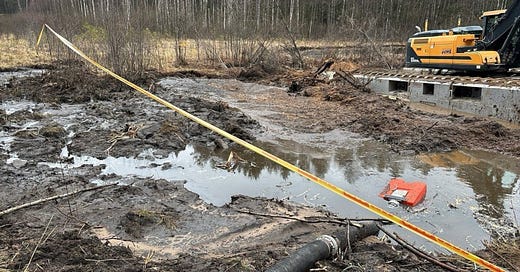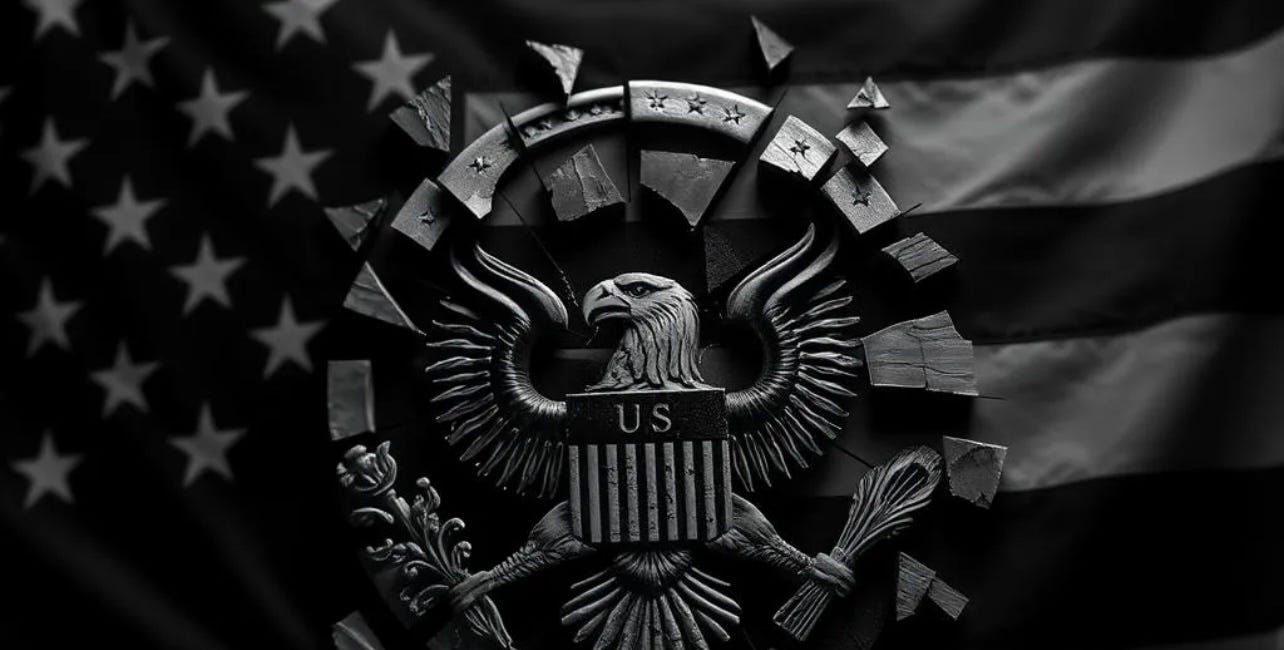Empire in the Group Chat: Missing Soldiers, Signalgate, and Trump’s War Plans
Four vanished Americans and leaked Signal messages show why Trump needs secrecy—and why military deaths are buried in silence. This isn't incompetence. It's prep work.
Update 4/1/2025: The bodies of all four missing soldiers have been recovered. Their names have not yet been released.
On March 25, four U.S. soldiers disappeared in a swamp near the Belarusian border. They were operating a 27-ton M88 Hercules armored recovery vehicle during a NATO-aligned training exercise in Pabradė, Lithuania. At some point during their early morning mission, their vehicle veered off course, sank into a peat bog, and vanished. It wasn’t until late that afternoon that Lithuanian officials received word that the crew was missing. By then, the soldiers had been unaccounted for for hours.
Their vehicle was eventually found submerged under sixteen feet of water and mud. Recovery crews spent days draining the bog and erecting berms to stabilize the soft ground. Underground gas lines had to be shut off to allow safe excavation. Polish divers and engineers were called in to assist. As of this writing, the soldiers are still officially missing—but the mission has shifted from search to recovery.
These four soldiers may already be dead. And yet, few Americans know their names. Fewer know their story.
The Mistake That Said Too Much
In the early hours of the search, NATO Secretary General Mark Rutte told reporters the four soldiers had died. The U.S. military hadn’t confirmed that. Lithuania hadn’t either. Within hours, NATO walked it back, claiming Rutte was simply referencing unconfirmed news reports. The headlines quickly changed from “U.S. Soldiers Killed in Training Accident” to “Status Unknown.”
That kind of mistake doesn’t happen unless someone is trying to say more than they’re allowed. Premature death announcements don’t emerge from nothing. It either reflects a severe internal communication breakdown within NATO—or the truth was momentarily allowed to breathe before someone realized it wasn’t politically convenient.
It’s also likely that the walk-back had less to do with uncertainty and more to do with protocol. The U.S. military doesn't confirm deaths until families are notified—and the NATO chief had just violated that boundary on a global stage. It wasn't just a misstep. It was a reminder that the story was never supposed to get out ahead of schedule.
And Then, Silence
The soldiers were part of a Georgia-based armored brigade conducting training as part of NATO’s deterrence strategy in Eastern Europe. Their mission: recover a disabled vehicle in rough terrain just miles from Belarus, a close ally of Russia. The location wasn’t random. The exercise was designed to send a message: NATO is active, capable, and ready to operate in difficult environments near hostile borders.
But the real message became clear in the hours that followed.
Trump, when asked if he had been briefed about the incident, replied:
“No, I haven’t.”
No outrage. No urgency. No statement of concern. No direct acknowledgment that four American soldiers were missing in a foreign swamp under unclear conditions.
The Pentagon issued sparse updates, with no formal Department of Defense press briefing. The story was buried under domestic political drama, economic updates, and the lingering fog of the Ukraine war. In a media ecosystem obsessed with spectacle, this quietly unfolding tragedy wasn’t loud enough to matter.
Benghazi, Reversed
In 2012, four Americans died in Benghazi, Libya. The incident launched eight congressional investigations, years of political attacks, and a full-scale assault on Hillary Clinton’s credibility and character. The deaths were real. The politicization was relentless.
In 2025, four American soldiers go missing during a NATO operation under a Republican president. A NATO leader misreports their deaths. The President isn’t briefed. The soldiers remain unaccounted for. And yet, there’s no political theater. No congressional hearings. No Fox News countdown clock.
What changed?
Nothing, except the party in power.
If a Democrat were in the White House, this would already be a scandal. Instead, it’s treated like a logistical hiccup. The absence of outrage isn’t apathy—it’s protection.
“Four dead in Benghazi” became a campaign slogan. “Four missing in Lithuania” hasn’t even become a headline.
Why Trump Won’t Touch This
If there’s one thing Trump never misses, it’s an opportunity to cast doubt on U.S. military deployments abroad—especially NATO missions. He’s spent years calling NATO obsolete, demanding allies pay more, and suggesting the U.S. has no business defending other nations.
And yet, as four American soldiers vanish in a swamp on NATO’s front line, he says nothing.
No tweet. No press release. No soundbite about “wasteful wars” or “protecting American lives.”
Just silence.
That silence isn't restraint. It’s a strategic dodge.
Because to comment on this would be to confront a contradiction: these soldiers were deployed under his presidency. They were following orders consistent with a foreign policy posture he claims to oppose. If he criticizes their mission, the question becomes: Why were they there in the first place? Why didn’t you bring them home?
He can’t pass the blame to Biden. He can’t wrap it in outrage about deep state warmongers or swampy elites. The tragedy happened on his watch. So instead of confronting the story, he buries it.
And maybe the silence isn’t just about avoiding blame.
Maybe it’s about avoiding attention—because attention leads to grief, and grief gets in the way of war.
Trump doesn’t want the American public associating military deployments with tragedy. Not now. Not while he's actively escalating talks of acquiring Greenland, annexing Canada, and reclaiming the Panama Canal.
Mourning is friction. Headlines are inconvenient.
And the best way to prepare for war is to make sure no one’s looking too closely at the last one.
Signalgate and the Death of Transparency
If the silence around the missing soldiers felt strategic, Signalgate confirmed it.
In what should have been a career-ending breach, members of Trump’s war cabinet accidentally shared sensitive military plans—including proposed airstrikes in Yemen and the identity of a CIA operative—in a Signal group chat. Even worse, they mistakenly included The Atlantic’s editor-in-chief, Jeffrey Goldberg, who promptly published the contents. The National Security Council quickly confirmed the authenticity of the leak.
But the administration’s response was pure deflection.
Defense Secretary Pete Hegseth dismissed the reports outright, stating, "Nobody's texting war plans, and that's all I have to say about that," openly contradicting his own administration's confirmation. Trump, meanwhile, blamed the messaging platform itself, suggesting Signal "could be defective."
No accountability. No explanation. No acknowledgment of how dangerous and reckless the exposure really was—or why the Defense Secretary openly contradicted the administration’s official statements.
And that's exactly the point.
This administration isn’t embarrassed by military failures. It’s embarrassed when they become public.
The leaked messages revealed plans for a significant escalation in Yemen—where recent U.S. airstrikes have intensified in an effort to weaken Houthi rebels. These operations have caused dozens of casualties, raising humanitarian concerns and risking regional destabilization. And yet, the administration's primary concern wasn't transparency or accountability—it was damage control.
Whether it’s soldiers sinking into a bog or war plans dropped into a journalist’s lap, the real priority is containment. Not security. Not transparency. Control.
And it’s not just a glitch in the system. It’s the system they want.
According to Project 2025—the official blueprint for Trump’s second term—federal agencies should avoid unnecessary paper trails, limit transparency obligations, and streamline internal communications away from FOIA-susceptible platforms.
"Exorbitant amounts of classified data are created daily, and agency personnel often mistakenly choose classification as the default selection to ensure national security. [...] Reforms should include tighter definitions and greater specificity for categories of information requiring protection, more stringent policies to effect significant reductions in the number of Original Classification Authorities (OCAs), stricter accountability measures at the OCA level, and enhanced metrics for accuracy of classification." - Project 2025, page 223
"Although the CRCL Officer and the Freedom of Information Act (FOIA) Officer/Privacy Officer are statutory, their offices are not mandatory." - Project 2025, page 164
In plain language: don’t get caught. Don’t document. Don’t make it possible for the public to ask too many questions.
It doesn’t mention Signal by name, but the tone is unmistakable. Privatized, encrypted, off-the-record communication isn’t just tolerated—it’s encouraged, especially when it comes to national defense. The lesson from Project 2025 is clear: scrutiny is the enemy of power.
So the Signal leak isn’t an aberration. It’s a dress rehearsal. A live test of what it looks like to plan war in the shadows while discrediting those who dare expose the process.
This isn’t incompetence. It’s prep work.
The Cost of Empire Is Always Paid Quietly
These soldiers weren’t conducting a high-risk raid. They weren’t even engaged in combat. They were performing a standard recovery mission during a NATO-aligned training exercise—helping extract a disabled vehicle from difficult terrain. They were doing what the military does every day: execute logistics, sustain readiness, uphold presence.
That routine cost them their lives. And yet the country they served hasn’t paused to notice.
There is a long tradition of minimizing military deaths when they are inconvenient. Training accidents get filed away as footnotes. Covert missions get buried beneath national security redactions. And under authoritarian-leaning administrations, inconvenient truths simply get omitted.
When war becomes normal and death becomes noise, silence isn’t peace—it’s complicity.
He Needs Us to Forget
Maybe they are still alive. Maybe they never had a chance. But what’s most chilling isn’t the uncertainty of their fate—it’s the certainty that their story was never meant to be told.
This isn’t just indifference. It’s preparation.
In the same week these men went missing, Trump revived his calls to claim Greenland, increased economic pressure by threatening “far larger” tariffs on Canada, and had the Pentagon actively preparing plans to “retake" the Panama Canal. These aren’t policy proposals. They’re territorial ambitions.
And you don’t rally a nation for expansion while they’re watching the flag get folded for someone else’s child.
Trump doesn’t want the deaths of these soldiers in the headlines—not because he’s anti-war, but because he’s planning for one.
Grief slows momentum. Death demands justification—and justification is the one thing empire can never afford.
They weren’t supposed to be a headline. Because Trump knows what happens when war becomes one.
Subscriber Fee Transparency: Currently, 100% of subscription fees are going into journalism and publications that make my research possible.
Prefer a one-time support option?
Further Reading
Analyses - In-depth breakdowns examining the systems driving democratic collapse—exposing threats, tactics, and timelines to empower informed resistance.
Playbooks - Actionable strategic guides that directly respond to each analysis, providing step-by-step resistance plans designed for immediate implementation.
Insights - Timely, targeted pieces highlighting critical events, emerging threats, and essential context—keeping you ahead of developments as they unfold.
Breaking Point: America's Military Crisis and the Threat to Democracy
Once you’ve read this and understand their playbook, read The Playbook for Resisting a Military Collapse and learn ours.
The Playbook for Resisting a Military Collapse
This Playbook serves as a strategic resistance guide, directly building on the critical insights outlined in Breaking Point: America’s Military Crisis and the Threat to Democracy. If you haven’t read that analysis yet, start there. This Playbook focuses on immediate, actionable strategies to counteract the dismantling of military institutions and the rising authoritarian threat.







I am an ex GI and I think it is terrible that these men are being ignored.
I think The Atlantic would benefit from some new subscribers.